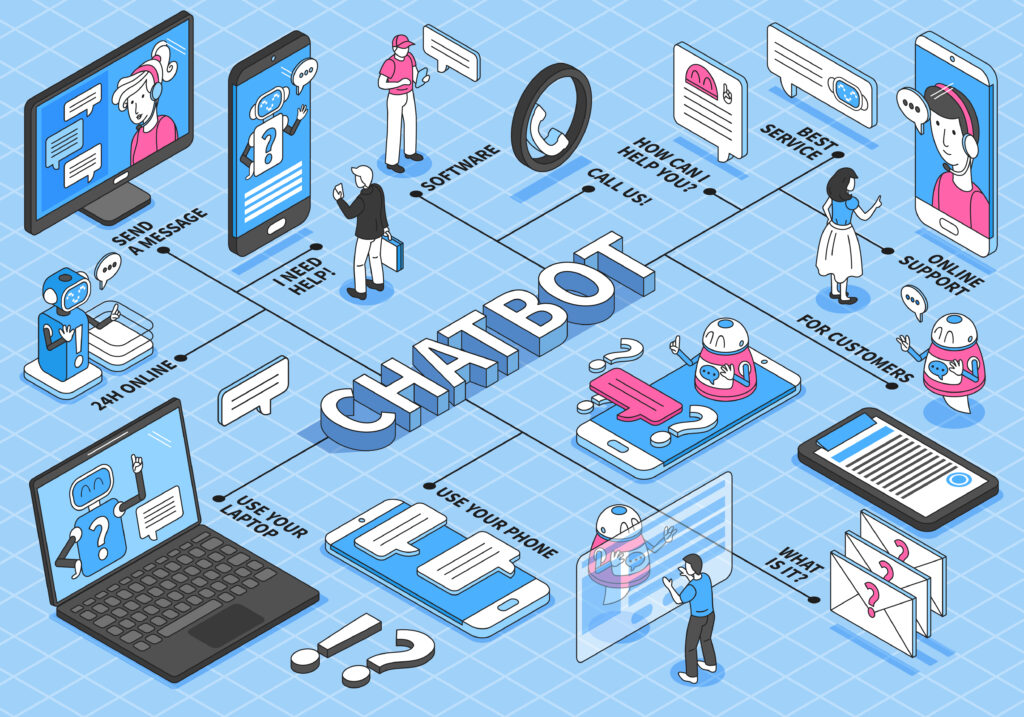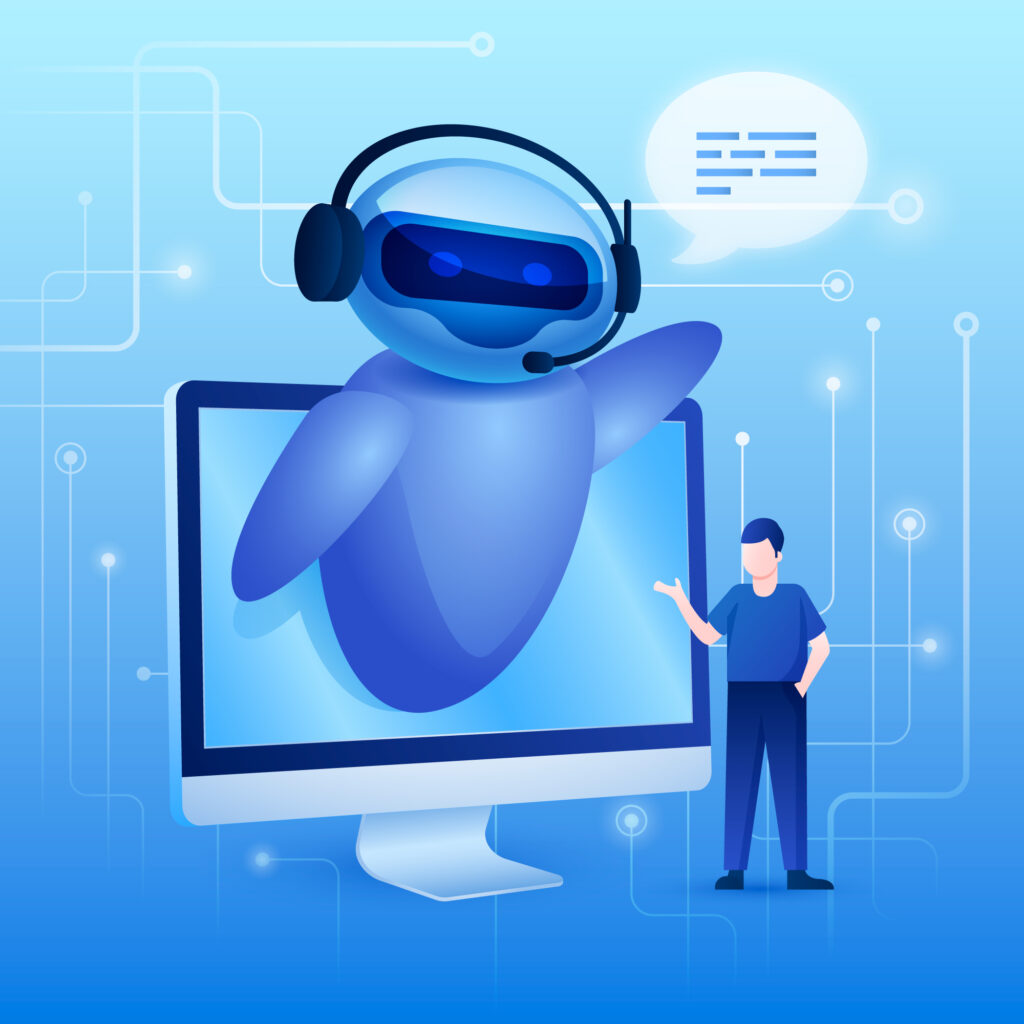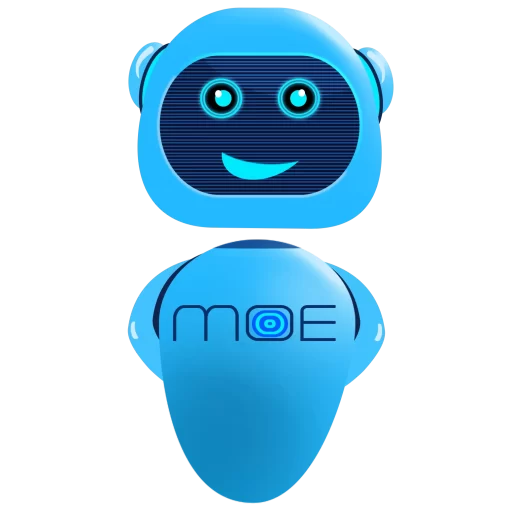In recent years, chatbots have become increasingly prevalent in various industries, revolutionizing the way businesses interact with their customers. With advancements in artificial intelligence and natural language processing, chatbots are now capable of providing personalized, efficient, and engaging customer experiences. In this article, we will explore the diverse applications of chatbots across different industries and delve into some of the key use cases where they have made a significant impact.

Table of Contents
1. Introduction
2. Chatbots in Customer Service
- Enhancing Customer Support
- Streamlining Ticket Resolution
- 24/7 Availability
- Multilingual Support
3. Chatbots in E-commerce
- Personalized Product Recommendations
- Simplifying the Buying Process
- Order Tracking and Updates
- Handling Returns and Refunds
4. Chatbots in Healthcare
- Appointment Scheduling and Reminders
- Symptom Analysis and Triage
- Medication Reminders and Dosage Information
- Mental Health Support
5. Chatbots in Banking and Finance
- Account Balance and Transaction Inquiries
- Fraud Detection and Prevention
- Financial Planning and Investment Advice
- Loan Application and Processing
6. Chatbots in Travel and Hospitality
- Flight and Hotel Bookings
- Travel Recommendations and Itinerary Planning
- Real-Time Customer Assistance
- Language Translation Support
7. Chatbots in Education
- Personalized Learning Experiences
- Homework and Assignment Help
- Exam Preparation and Study Tips
- Student Counselling and Guidance
8. Chatbots in Human Resources
- Recruitment and Candidate Screening
- Employee Onboarding and Training
- HR Policy and Benefits Information
- Performance Evaluation and Feedback
9. Conclusion
10. FAQs
11. Can chatbots completely replace human customer service agents?
12. Are chatbots capable of understanding multiple languages?
13. How secure are chatbots when dealing with sensitive financial information?
14. Can chatbots adapt to different teaching styles in educational settings?
15. What are the potential drawbacks of using chatbots in various industries?
Chatbots, powered by artificial intelligence, have emerged as a transformative technology, enabling businesses to automate interactions with their customers. By leveraging natural language processing and machine learning algorithms, chatbots can understand and respond to user queries in a conversational manner, mimicking human-like interactions.
- Chatbots in Customer Service
2.1 Enhancing Customer Support
One of the primary applications of chatbots is in customer service. Chatbots can handle a wide range of customer inquiries, providing instant responses and resolving common issues efficiently. They can assist customers with product information, order tracking, and general support, freeing up human agents to focus on more complex tasks.
2.2 Streamlining Ticket Resolution
Chatbots can help streamline ticket resolution processes by automatically categorizing and prioritizing customer tickets based on their urgency and complexity. By doing so, they ensure that high-priority issues are addressed promptly, leading to improved customer satisfaction.
2.3 24/7 Availability
Unlike human agents who have limited working hours, chatbots can provide round-the-clock support to customers. This 24/7 availability ensures that customers can receive assistance and resolve their queries at any time, increasing customer loyalty and reducing response time.
2.4 Multilingual Support
With the ability to understand and communicate in multiple languages, chatbots can cater to customers from diverse linguistic backgrounds. This feature is particularly beneficial for businesses operating globally, as it eliminates language barriers and improves the overall customer experience.
- Chatbots in E-commerce
3.1 Personalized Product Recommendations
Chatbots can analyze customer preferences and purchase history to offer personalized product recommendations. By understanding customers’ tastes and preferences, chatbots can suggest relevant products, increasing the chances of a successful purchase and boosting sales.
3.2 Simplifying the Buying Process
Chatbots can guide customers through the buying process by providing real-time assistance. They can answer product-related questions, offer detailed information, and facilitate seamless transactions, creating a frictionless shopping experience.
3.3 Order Tracking and Updates
By integrating with order management systems, chatbots can provide customers with real-time updates on their order status. Customers can inquire about delivery dates, track their packages, and receive notifications, ensuring transparency and enhancing post-purchase satisfaction.
3.4 Handling Returns and Refunds
Chatbots can assist customers with return and refund processes, simplifying the often cumbersome procedures. They can guide customers through the necessary steps, collect relevant information, and initiate the return or refund process, thereby improving customer experience and reducing operational costs.
- Chatbots in Healthcare
4.1 Appointment Scheduling and Reminders
Chatbots can facilitate the booking of medical appointments by interacting with patients in a conversational manner. Patients can check the availability of doctors, schedule appointments, and receive reminders, optimizing healthcare providers’ scheduling processes.
4.2 Symptom Analysis and Triage
Chatbots equipped with medical knowledge can assist users in assessing their symptoms and providing initial guidance. By asking relevant questions, chatbots can suggest possible conditions and recommend appropriate next steps, helping users make informed decisions about seeking medical assistance.
4.3 Medication Reminders and Dosage Information
For patients on long-term medication, chatbots can serve as reminders for taking medication at the prescribed times. Additionally, they can provide dosage information and answer questions related to medications, ensuring patients adhere to their treatment plans.
4.4 Mental Health Support
Chatbots can offer support and guidance for individuals experiencing mental health challenges. They can provide resources, coping mechanisms, and empathetic conversations, acting as a valuable supplement to traditional therapy and counseling services.
- Chatbots in Banking and Finance
5.1 Account Balance and Transaction Inquiries
Chatbots can provide customers with real-time information about their bank account balances, recent transactions, and credit card statements. Users can simply interact with the chatbot to obtain the desired information, eliminating the need for manual checks or phone calls.
5.2 Fraud Detection and Prevention
By continuously monitoring user transactions, chatbots can identify suspicious activities and raise alerts in real-time. This proactive approach enhances security measures and helps prevent financial fraud, protecting both customers and financial institutions.
5.3 Financial Planning and Investment Advice
Chatbots can assist users in making informed financial decisions by providing personalized financial planning advice. They can analyze users’ financial profiles, offer investment recommendations, and educate users on various financial concepts, empowering them to achieve their financial goals.
5.4 Loan Application and Processing
Chatbots can streamline the loan application and processing procedures by guiding users through the necessary steps. They can collect required information, verify eligibility criteria, and provide updates on the application status, simplifying the overall loan experience for customers.
- Chatbots in Travel and Hospitality
6.1 Flight and Hotel Bookings
Chatbots can assist travelers in searching and booking flights, hotels, and other travel-related services. They can provide real-time information on availability, pricing, and promotions, helping users make informed decisions and facilitating smooth travel planning.
6.2 Travel Recommendations and Itinerary Planning
By understanding users’ preferences and travel requirements, chatbots can offer personalized travel recommendations and assist in itinerary planning. They can suggest popular attractions, dining options, and activities based on the user’s location and interests, enhancing the overall travel experience.
6.3 Real-Time Customer Assistance
During travel, chatbots can provide real-time customer assistance, addressing queries related to flight delays, cancellations, or hotel reservations. They can offer alternative options, rebooking assistance, and travel tips, ensuring travelers feel supported throughout their journey.
6.4 Language Translation Support
Chatbots equipped with language translation capabilities can help bridge the language gap for international travelers. They can assist with translation of phrases, directions, or basic communication, making it easier for travelers to navigate foreign destinations.
- Chatbots in Education
7.1 Personalized Learning Experiences
Chatbots can deliver personalized learning experiences by adapting content and difficulty levels to individual students’ needs. They can provide customized study materials, practice quizzes, and interactive lessons, enhancing the effectiveness of educational programs.
7.2 Homework and Assignment Help
Students can seek assistance from chatbots for homework and assignment-related queries. Chatbots can provide explanations, offer examples, and guide students through problem-solving processes, promoting independent learning and academic success.
7.3 Exam Preparation and Study Tips
Chatbots can support students in exam preparation by offering study tips, time management strategies, and practice exams. They can provide feedback on students’ performance, identify areas for improvement, and suggest targeted study resources, contributing to better exam outcomes.
7.4 Student Counseling and Guidance
Chatbots can offer counseling and guidance to students, addressing concerns related to academic choices, career paths, or personal challenges. They can provide resources, coping strategies, and empathetic conversations, promoting student well-being and success.

- Chatbots in Human Resources
8.1 Recruitment and Candidate Screening
Chatbots can assist in the recruitment process by engaging with candidates, collecting initial information, and conducting preliminary screenings. They can ask relevant questions, assess qualifications, and recommend suitable candidates for further evaluation, streamlining the hiring process.
8.2 Employee Onboarding and Training
Chatbots can guide new employees through the onboarding process, providing them with essential information, training modules, and answering common questions. They can facilitate a smooth transition into the organization, ensuring employees feel supported and well-informed.
8.3 HR Policy and Benefits Information
Employees can interact with chatbots to access information about HR policies, employee benefits, and company procedures. Chatbots can provide detailed explanations, policy documents, and guide employees on relevant processes, promoting transparency and self-service.
8.4 Performance Evaluation and Feedback
Chatbots can assist in the performance evaluation process by collecting feedback from employees and managers. They can facilitate anonymous surveys, prompt performance-related questions, and compile data for analysis, aiding in the assessment and improvement of employee performance.
- Conclusion
Chatbots have become indispensable tools in various industries, transforming customer experiences, streamlining processes, and providing valuable support. From customer service to healthcare, e-commerce to education, chatbots have proven their versatility and effectiveness in a wide range of applications. As technology continues to advance, we can expect chatbots to play an even more significant role in shaping the future of customer engagement and business operations.
FAQs
- Can chatbots completely replace human customer service agents?
While chatbots can handle a significant volume of customer inquiries and provide efficient support, they may not completely replace human agents. Complex or emotionally sensitive issues often require human intervention and empathy. However, chatbots can work alongside human agents, augmenting their capabilities and improving overall customer service.
- Are chatbots capable of understanding multiple languages?
Yes, chatbots can be designed to understand and communicate in multiple languages. With advancements in natural language processing, chatbots can accurately interpret and respond to user queries in different languages, enabling businesses to provide multilingual support.
- How secure are chatbots when dealing with sensitive financial information?
Chatbot developers prioritize security and implement robust measures to protect sensitive information. By using encryption, secure connections, and following industry-standard security practices, chatbots ensure the confidentiality and integrity of financial data.
- Can chatbots adapt to different teaching styles in educational settings?
Yes, chatbots can be programmed to adapt to different teaching styles and individual learning preferences. They can provide personalized learning experiences, offer alternative explanations, and adjust the difficulty level of content to accommodate diverse learning needs.
- What are the potential drawbacks of using chatbots in various industries?
While chatbots offer numerous benefits, there are some potential drawbacks to consider. Chatbots may struggle with understanding complex or nuanced queries, and there can be limitations in their ability to provide human-like empathy. Additionally, chatbots require regular updates and maintenance to stay up-to-date with evolving customer needs and industry trends.

